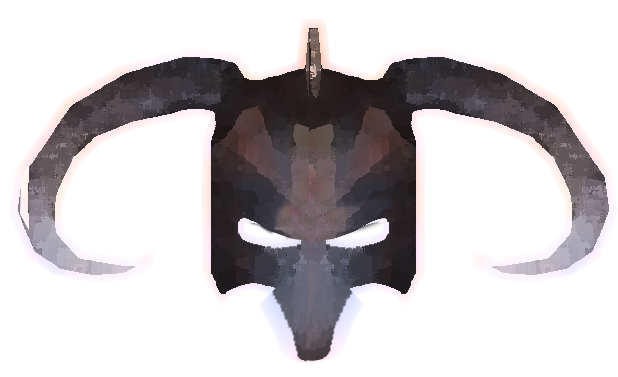Varglokirr (3.5e Deity)
- This deity no longer exists as a living and/or worshippable entity in the Tirr setting, but has influenced a great amount of lore and may possibly influence current events, and therefore has been added for posterity.
| Greater Deity | |
|---|---|
| Symbol: | The Warlord's Helm, depicted below |
| Home Plane: | Deific Sphere |
| Alignment: | Neutral Evil |
| Portfolio: | Oppression, Usurpers, Conquerors, Authority, Rule |
| Clergy Alignments: | CE, NE, LE, N |
| Domains: | Evil, Nobility, Law, Strength, War |
| Favored Weapon: | Battleaxe, Greataxe, Greatsword, Net, Punching Dagger, Warhammer, Dagger |
Varglokirr
During the time before recorded history, collectively known as the Age of Myths by most scholastic authorities, when even the deities themselves were relatively newly born, there was no material sphere. In the vast divine sea, only they existed, and no order was to be found. Varglokirr attempted to impose that order, under his own tyrannical rule, and thus began a great conflict which shaped the state of the world as it has come to be known: The War of the Deific Sphere, as it were, was responsible for the creation of the Pantheon of Tirr as a governing body, and the resultant schism with the Aesir.
The cause of the whole of the conflict was a specific deity known as Varglokirr, who had become very powerful politically and physically, and began attempting to consolidate that power among his brethren. Some willingly followed, such as the infamous Proditor, while others resisted and were either destroyed or forced into servitude, which caused the remaining deities to rally together against him in a long and bloody conflict which thinned the ranks of all deities to only a handful remaining, toward the end of the great conflict. One of the most infamous incidents attributed to the warlord is the slaughter of Isis' charges.
When Varglokirr was ultimately defeated in a cataclysmic last stand, mounted by the remaining greater deities in great desperation, he was torn asunder. With great haste, Mana, Fate, and Tirros deployed their greatest collaborative work: A masterwork of planar folding, contained within a great golden sphere. His essence was cast into this sphere, scattered across the many different planes, all bound and sealed individually, before the great planar sphere was ultimately sealed, itself. This construct would later become the world of Tirr, named after Tirros who fashioned the globe, itself.
No current depiction of Varglokirr exists in the current era, and no common individual or group knows of him outside of myth and legend that have grossly distorted other descriptions of the god or his character. The only individuals who truly know anything about his character or appearance are other deities, such as the Pantheon deities and Aesir, but most are not very talkative about the subject.
Dogma
According to the few surviving records, written by scholars or historians who pressed amicable deities such as Mana and Undine for answers on the matter, Varglokirr embodied the ideals of Oppression and Tyranny, and as such, sought to rule over all of creation with a firm and unyielding hand. He is described as having been an incredibly cruel and merciless tyrant, as well as being incredibly powerful to match, only being defeated when the remaining greater deities and their forces united to defeat him.
Ironically enough, the unwavering rule that Varglokirr placed enough doubt and fear in most of the other deities that after he was defeated, the Pantheon was created by instituting the Oath, another absolutist rule that could not be challenged. The irony was not lost on many of the deities, and was even quoted by some of the Aesir as reason for not joining the new Pantheon.
He is often called the "Tyrant God" or "Mad God" by the surviving deities out of spite, but only the former of these accusations are true. According to all sources, no evidence exists to suggest that Varglokirr was actually mad or insane, in any way.
Clergy and Temples
No known temples or shrines to Varglokirr exist, nor do any individuals worship him, as he no longer exists as a god. Furthermore, information regarding the deity is so sparse that he can only be discussed between the gods with any level of authority, and even sages of the highest order struggle to cite statistics regarding the god.
Some individuals may worship is lieutenant, Proditor, but the treacherous god often has his own ends and goals that do not wholly align with that of his former master. Furthermore, when Proditor disappeared during the 3rd Era, his cults nearly completely fell apart in the centuries after, as he no longer answered summons, communions, or granted divine power to his followers.
Pantheon
All other deities in Tirr, with the notable exception of Proditor, look at the fate of Varglokirr as completely justified and necessary. Even evil deities, such as Mephistopheles and Serberus, have their own gripes about his tyranny and joined the other deities in revolting against him.
Isis, perhaps, has one of the greatest losses attributed to him, as she cared for many weaker deities during the wars duration, and ultimately saw them slaughtered by the cruel god. This event is often attributed to her reason for refusing the Pantheon and seeking solitude in grief.
He is responsible for the obliteration of enumerable deities during his oppressive reign and the subsequent war of the deific sphere, and therefore holds a special place of revulsion and reverence, even among his former enemies. The only other instance of a death of a god would be Sympatheia, which lends an air of solemnity and weight to his name, when invoked.
Back to Main Page → 3.5e Homebrew → Deities → Greater
Back to Main Page → 3.5e Homebrew → Campaign Settings → Tirr Campaign Setting
